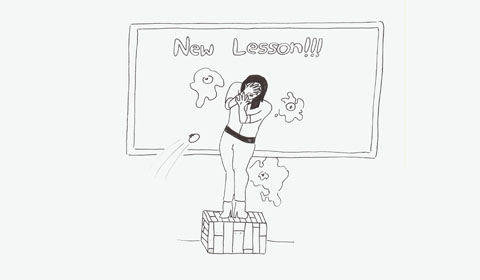
Picture a group of rowdy students yelling across the classroom and jumping out of their seats as a frazzled young teacher unsuccessfully tries to regain order. One of the students stands on top of her desk and begins to chant a battle-cry, “Rebel!,” which the rest of the students pick up as they rally around her.
While it’s hard to imagine the scene of a student mutiny at Marlborough, new teachers often face the daunting initiation of students who try to manipulate or abuse their lack of knowledge of Marlborough’s protocol.
Wesley ’15 was part of a French class two years ago that picked on their new teacher because the students found her rude and unresponsive when they asked her to modify her teaching methods.
“These things led us to lose respect for her, which I think is something that is crucial in a student-teacher relationship,” Wesley said.
Some students showed their opposition by doing things to stress her out or throw her off during class, like replacing the SMARTBoard markers with regular markers and locking her out of the room when she left to print an assignment.
“I think that made the class worse as a whole. They were meaningless jokes, but it still probably wasn’t the best way to handle the situation,” Wesley added.
A lack of certainty concerning School policies also makes new teachers hesitant to enforce rules in the classroom because they are unsure of what the right procedure is. For example, if a teacher questions the policy for late homework, the class may give conflicting answers regarding what time it can be turned in or how many points should be deducted.
Rather than merely feeding teachers wrong information to save their grades, Ellie ’16 thinks that some girls put pressure on new teachers to act the same way or know the same things that more established teachers might.
“Girls pressure new teachers to understand the student-teacher standards that we go by at Marlborough in order to have a better knowledge of the course and allow the teacher to learn the expectations of the students,” Ellie stated.
A teacher who wished to remain anonymous posits that the all-girls environment contributes to the intimidation factor imposed on some teachers.
“I think there’s a little bit of a gang mentality to see how much they can push a teacher… but there’s also a sense of students feeling like this is their school and they don’t want their ground to be threatened, so they put up defense mechanisms,” the teacher commented.
The teacher mentioned that on first impression, the students and faculty seemed well-meaning but that stories such as Wesley’s counter that idea.
“Just because we’re teachers doesn’t mean we’re not human, that we don’t have our own set of insecurities or intimidations or feelings of anxiety when we step into a new classroom,” the teacher said.



